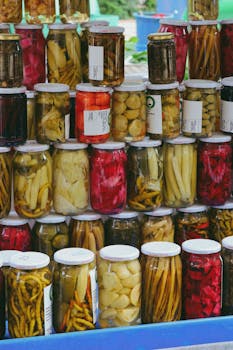As pet parents, we all want to share our favorite snacks with our dogs. But when it comes to pickled vegetables, is it safe to let your pup take a bite? While these tangy treats might be a tasty addition to your plate, they’re not always the best option for your furry friend. Let’s explore whether dogs can eat pickled vegetables, the risks involved, and what to do if your pup sneaks a bite.
🥒 What Are Pickled Vegetables?
Pickled vegetables are veggies preserved in a solution of vinegar, water, salt, and sometimes sugar or spices. Common examples include pickled cucumbers, carrots, beets, and peppers. While pickling extends shelf life and adds a distinct tangy flavor, it also introduces ingredients that may not be ideal for dogs.
The key concern with pickled vegetables lies in their high sodium content and the presence of potentially harmful additives like garlic, onions, and spices. These ingredients can pose serious risks to your dog’s health, even in small amounts.
🐕 Are Pickled Vegetables Safe for Dogs?
In general, pickled vegetables are not recommended for dogs. While a plain, unseasoned vegetable might be okay for occasional snacking, the pickling process introduces ingredients that can cause problems. Here’s why:
- High sodium levels can lead to dehydration or salt poisoning.
- Garlic and onions, often used in pickling, are toxic to dogs.
- Spices and vinegar can irritate your dog’s digestive system.
Even if your dog shows interest in these tangy veggies, it’s best to avoid giving them any pickled foods. Instead, stick to plain, dog-safe vegetables like carrots or green beans.
⚠️ Risks of Pickled Vegetables for Dogs
Feeding pickled vegetables to your dog can lead to several health issues. Here are some of the most common risks:
- Sodium poisoning: Excessive salt can lead to symptoms like vomiting, diarrhea, lethargy, and in severe cases, seizures or kidney damage.
- Gastrointestinal upset: Vinegar and spices can irritate your dog’s stomach, leading to nausea or discomfort.
- Onion or garlic toxicity: Even small amounts of these ingredients can damage your dog’s red blood cells, causing anemia.
- Weight gain: Pickled vegetables with added sugar can contribute to unnecessary calories and weight gain.
If your dog accidentally consumes pickled vegetables, monitor them closely for any signs of distress. Severe symptoms like difficulty breathing, pale gums, or seizures require immediate veterinary attention.
🩺 What to Do If Your Dog Eats Pickled Vegetables
If your dog has eaten pickled vegetables, don’t panic. The level of risk depends on the type of vegetable, the ingredients used in the pickling process, and how much your dog consumed. Follow these steps:
- Check the label for harmful ingredients like garlic, onions, or excessive salt.
- Observe your dog for symptoms such as vomiting, diarrhea, or lethargy.
- Offer fresh water to help flush out excess sodium.
- Contact your veterinarian for guidance, especially if toxic ingredients were involved.
In most cases, a small amount of pickled vegetables without harmful additives won’t cause long-term harm. However, it’s always better to consult your vet for peace of mind.
🥦 Dog-Friendly Alternatives to Pickled Vegetables
Instead of pickled vegetables, opt for fresh, plain veggies that are safe and nutritious for your dog. Some great options include:
- Carrot sticks
- Cucumber slices
- Green beans
- Sweet potato (cooked and unseasoned)
- Broccoli (in small amounts)
These alternatives are low in sodium and free from harmful additives, making them a healthy choice for your pup. Remember to introduce new foods gradually and in moderation to avoid digestive upset.
🧭 How to Prevent Accidental Snacking
Dogs are naturally curious and may try to sneak a bite of your food when you’re not looking. To prevent accidental snacking on pickled vegetables, follow these tips:
- Store pickled foods in tightly sealed containers, out of your dog’s reach.
- Keep an eye on your plate during meals and avoid leaving food unattended.
- Train your dog with commands like “leave it” or “drop it” to discourage them from eating off-limits items.
By taking these precautions, you can help ensure your dog stays safe and avoids potentially harmful foods.
FAQs
Can dogs eat pickled cucumbers?
Pickled cucumbers are not recommended for dogs due to their high sodium content and potential additives like garlic or onion.
What happens if my dog eats pickled onions?
Pickled onions are toxic to dogs and can cause serious health issues like anemia. Contact your veterinarian immediately if your dog eats pickled onions.
Are there any pickled vegetables that are safe for dogs?
It’s best to avoid all pickled vegetables, as the pickling process introduces ingredients that can be harmful to dogs. Stick to plain, fresh vegetables instead.
Can I rinse pickled vegetables to make them safe for my dog?
Rinsing pickled vegetables may reduce some sodium but won’t remove harmful ingredients like garlic or onion. It’s safer to avoid them entirely.
How much salt is too much for dogs?
Even small amounts of excess salt can be harmful to dogs. Always consult your vet if you’re concerned about your dog’s sodium intake.
References
Book a $49 online vet consultation at https://www.dialavet.com for fast, expert advice.








